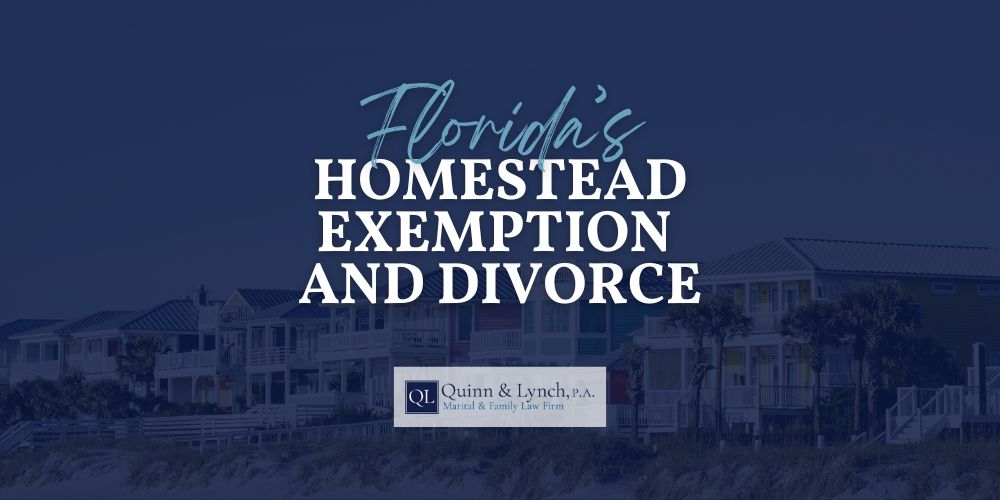Florida’s homestead exemption and divorce can raise many questions for homeowners who are ending a marriage, especially when the family home is one of the most valuable assets. At Quinn & Lynch, P.A., we help husbands and wives in Tampa and throughout Florida understand how the homestead exemption, property tax rules, and homestead protection under Florida law may affect their marital property, permanent residence, and future tax savings.
Whether you are trying to protect your primary residence, understand how ownership is divided, or learn how the exemption applies after a sale or transfer, our Tampa property division attorneys can give you clear answers and help you protect your home, equity, and rights. Call us today at (813) 223-7739 or contact us online to speak with an experienced family law attorney about your situation.
What Is Florida’s Homestead Exemption?
Florida’s homestead exemption is a legal benefit that can protect a homeowner’s primary residence and lower property taxes. Under Florida law, a qualifying homestead property may receive protection from certain creditors, limits on property tax increases, and valuable tax savings.
For property owners going through a divorce, understanding how the exemption applies to marital property is crucial because it can impact the home’s assessed value, equity, and the division of ownership.
Definition and Purpose Under Florida Law
Under Florida law, the homestead exemption applies to a property that serves as a homeowner’s permanent residence. The Florida Constitution provides homestead protection to help property owners keep their homes safe from most forced sales by creditors, except for specific debts such as property taxes or mortgages. This protection applies to real property within the state and can extend to both a husband and wife if the home is marital property. For many homeowners, especially during a divorce, the homestead exemption is an important safeguard to protect the home’s value and provide stability.
Eligibility Requirements
To qualify for the homestead exemption, a homeowner must meet specific requirements under Florida law. The property must be the homeowner’s primary residence as of January 1 of the tax year. The homeowner must also hold legal or beneficial ownership of the property and provide proof of Florida residency, often by showing a Florida driver’s license or voter registration. Only one spouse can claim the exemption on one property at a time, and the exemption does not apply to vacation homes or investment properties. If a divorce leads one spouse to move to a new residence, the other spouse may continue to benefit from the exemption on the original homestead property if they remain eligible.
Tax Benefits
The homestead exemption can provide significant tax savings for eligible Florida homeowners. It allows a portion of a property’s assessed value, currently up to $50,000 for most homeowners, to be exempt from certain property taxes, including school district taxes on the first $25,000. In addition, the “Save Our Homes” cap limits the annual increase in the property’s assessed value, providing long-term benefits for homeowners who remain in the same residence.
For divorcing couples, these tax benefits can influence decisions about whether to keep, sell, or transfer ownership of the marital home. Understanding these benefits can help homeowners make informed choices about their property, equity, and future housing plans.
Homestead Exemption and Divorce in Florida

When a marriage ends, Florida’s homestead exemption can play a major role in how the marital home is handled. The exemption not only offers property tax savings but also provides homestead protection under the Florida Constitution, which may affect how the home is divided between spouses.
Because the homestead is often a couple’s most valuable asset, decisions about ownership, sale, or transfer can be influenced by the property’s assessed value, existing tax benefits, and whether one spouse intends to keep the home as their primary residence.
Marital Property Division Under Florida Law
Under Florida law, marital property includes most assets acquired during the marriage, including the homestead property if it was purchased or maintained while married. In a divorce, the court will determine how to divide the value and equity of the home fairly, taking into account factors such as each spouse’s contributions, the home’s assessed value, and any existing mortgage.
If the property qualifies for the homestead exemption, the benefit may continue for the spouse who keeps the home as their permanent residence. However, only one spouse can receive the exemption on a single property, and a new homestead exemption may be available if the other spouse purchases a new residence that qualifies.
Impact on the Marital Home
The homestead exemption can significantly impact what happens to the marital home after a divorce. If one spouse remains in the property as their primary residence, the exemption can continue to be automatically renewed each year as long as the eligibility requirements are met. This provides ongoing tax savings and homestead protection against most creditors. If the home is sold, the exemption ends, and the property’s assessed value resets for the new owner, which can affect future property taxes. For couples considering a sale, transfer, or buyout, understanding how the exemption applies can help both spouses protect their financial interests and make informed decisions about the property.
Who Gets the Homestead After Divorce?
In a Florida divorce, deciding who keeps the homestead property can be one of the most important decisions for both spouses. The answer often depends on whether the home is marital property, the property’s assessed value, and each spouse’s financial ability to maintain it as a permanent residence.
Factors such as the homestead exemption, existing mortgage obligations, and tax savings can influence whether the house is kept, sold, or transferred. In some cases, the spouses reach an agreement through negotiation, while in others, the court makes the final decision.
Negotiated Settlements
Many divorcing couples choose to resolve who gets the homestead through a negotiated settlement. This approach allows the husband and wife to agree on whether one spouse will keep the property, sell it, or transfer ownership in exchange for other assets. A settlement can take into account the home’s equity, the benefit of the homestead exemption, and whether one spouse will continue to qualify for homestead protection under Florida law.
Negotiating an agreement may also allow for more flexibility, such as granting one spouse temporary possession until the children finish school in that school district, before selling the property.
Court Decisions Under Florida Law
If the spouses cannot agree, the court will determine ownership of the homestead property in accordance with Florida law. The court considers the home’s status as marital property, each spouse’s financial situation, and whether the property serves as a primary residence for minor children.
In some cases, the court awards the home to one spouse, often the one who will remain there with the children, and orders an equitable distribution of other assets to balance the division. The homestead exemption can continue to apply if the awarded spouse remains eligible, thereby protecting the property from most creditors and preserving the tax savings.
Mortgage and Debt Considerations
Whether determined by agreement or court order, the decision about who gets the homestead often depends on the mortgage and any other debts tied to the property. If one spouse remains in the home, they may also assume responsibility for the remaining mortgage payments, property taxes, and maintenance costs. In some cases, refinancing is needed to remove the other spouse from the mortgage and title. These financial factors can affect the property’s assessed value, eligibility for the homestead exemption, and whether keeping the home is realistic for one spouse after the divorce.
Homestead Exemption and Child Custody
In Florida, the homestead exemption can play a role in child custody arrangements when the marital home is involved. If the home is the children’s primary residence, courts may consider keeping them in that environment to provide stability. Under Florida law, this can mean awarding the homestead property to the spouse who will be the children’s primary caregiver, allowing them to continue benefiting from the property’s assessed value limits, tax savings, and homestead protection.
The exemption remains in effect as long as the property continues to serve as the caregiver’s permanent residence and meets the eligibility requirements. This arrangement can also help maintain the children’s connections to their school district, neighborhood, and daily routines while preserving the financial benefits of the homestead.
If you’re going through a divorce and wondering how the homestead exemption may affect where your children live, call Quinn & Lynch to discuss your options with a Tampa child custody attorney.
Limits and Exceptions to Homestead Protection

While Florida’s homestead protection offers strong safeguards for a primary residence, there are important limits and exceptions under Florida law. The homestead exemption does not protect against all types of debts; property taxes, mortgages, and certain liens can still lead to a forced sale.
Additionally, the protection only applies to real property that qualifies as a permanent residence and meets the ownership requirements. If one spouse moves out after a divorce and establishes a new homestead, the exemption for the original property may no longer apply to them.
Homestead protection is also limited by acreage restrictions: up to one-half acre within a municipality or up to 160 acres outside a municipality. Understanding these exceptions is important for property owners who want to protect their home’s value and equity during and after a divorce.
Steps to Protect Your Homestead Rights in Divorce
If you own a home in Florida and are going through a divorce, taking the right steps can help protect your homestead rights, tax savings, and equity. Because the homestead exemption can affect property taxes, ownership rights, and financial security, it’s important to understand your options under Florida law and act quickly.
- Gather and Review Property Records: Collect deeds, mortgage statements, property tax bills, and any documents showing ownership, the property’s assessed value, and exemption status.
- Confirm Homestead Designation with the County: Check with the county property appraiser to verify that your home is officially recorded as a homestead property and that the exemption applies.
- Get a Professional Property Appraisal: Obtain an accurate valuation of the home to determine equity, guide property division discussions, and understand how the assessed value compares to market value.
- Work with an Experienced Florida Divorce Attorney: A knowledgeable divorce attorney in Tampa can explain how Florida’s homestead exemption and divorce laws apply to your situation, help protect your rights, and guide you through negotiations or court proceedings.
Contact the Tampa Property Division Attorneys at Quinn & Lynch for Guidance on Florida’s Homestead Exemption Laws Today

If you’re navigating a divorce in Florida and have questions about how the homestead exemption may affect your home, rights, and financial future, Quinn & Lynch is here to help. Our attorneys understand how Florida law treats homestead property in divorce, including its impact on property division, tax savings, and protection from creditors.
We work with husbands, wives, and homeowners throughout Tampa to protect their interests, whether that means keeping the home, transferring ownership, or preparing for a sale. Call us today at (813) 223-7739 or contact us online to get clear answers and take the next step toward protecting your home and assets.













